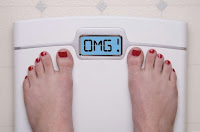"Don't be afraid of the X in front of that L, honey."
-Angelina Santiago
I detest shopping. I always have. When your clothes are twice as expensive as the rest, clearance means you're paying a smaller person's full price, and your selection is limited, there's not much joy to be had in shopping. Add in that I am tall with an above average shoe size and shopping for myself is a miserable experience.
Or rather, was a miserable experience.
At my heaviest, there were 5 or 6 X's in front of that L. My selection was limited to items with glitter splayed across the chest amid motifs of flowers not found in nature. Why yes, please, I'd love to look like a sparkly couch. That's been my desire: to have my girth not hidden but designed to catch attention as far as the eye can see.
Since the surgery, I haven't really noticed my clothes changing. It almost always has to be pointed out to me. It's not until I bend over and nearly lose my pants that I think maybe these ARE a little big now.
You see, I'm still that lady. Mentally, I am still the owner of those X's. They follow me around like a prison sentence. My perception is that I need them. They are comforting. They cover my shape, they keep attention at bay, and no one laughs if I think I'm invisible.
The reality is that I WASN'T invisible at 380 pounds. The extra weight didn't protect me or provide a barrier, it made me more visible. It drew attention like a magnet: nearly all of it negative. Stares, smirks, whispers, full out demeaning comments from those brave enough to just berate me out loud; I've been subjected to it all.
I was fully prepared for it to happen again.
You see, we just recently returned from vacation. I had to walk into one of my biggest fears: a theme park. About three years ago (in the midst of my first round of weight loss), I got stuck. I thought I'd lost enough to ride a ride at a fair. Not so much. I had to wiggle myself out of a swinging seat in front of what felt like a million people.
As I stood in line with my rollercoaster buddy (AKA, my son), I could feel that anxiety welling up. What if I don't fit? What if I have to get right back up in front of all these people? What if I disappoint him?
With a 45 minute wait to the front of the line and plenty of people smaller than me to look at, I just KNEW there was no way I was going to be able to ride. At the end of the wait, I sat down. Pulled the lap bar across me...and heard the buzz that indicated it was locked.
It. Was. Locked.
I. Fit.
No stares. No smirks. No whispers. Just me, my son, 167 feet, and 65 MPH of pure triumph. I was able to ride on everything I wanted. It was amazing.
On the way back, we stopped for a little shopping. I know I need new work clothes, and I'm trying to space out purchases as much as possible to not have to buy repeatedly. I held an XXL up to me, thinking it might be a little snug. My mom's response?
"That's too big."
And she was right. All the tops I purchased now only have one X in front of that L. Another top, with a more formed style, was purchased for when I could fit it later.
It. Fits.
So that's the current focus: working to change my perception of what fits. Not just in clothing, but in size. I'm not the scared girl who needs to hide behind food to be comfortable. I no longer have to fear that I won't fit, because I fit me. I fit my family. I fit in this world exactly as I'm meant to fit.
Yes, it's going to continue to change. I know (sort of) that I'm going to eventually lose the X in front of that L.
But for now:
It. Fits.




